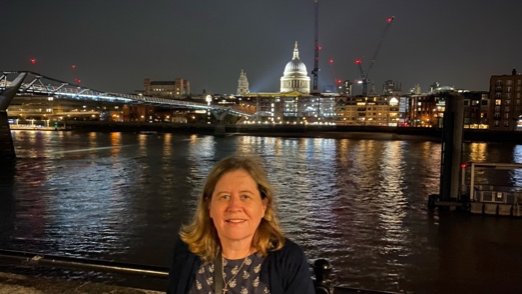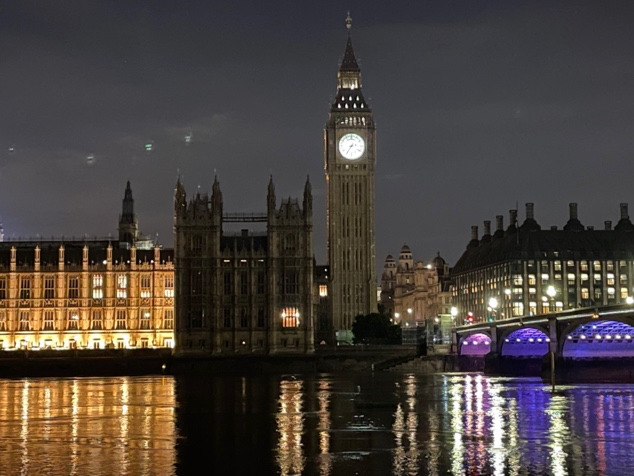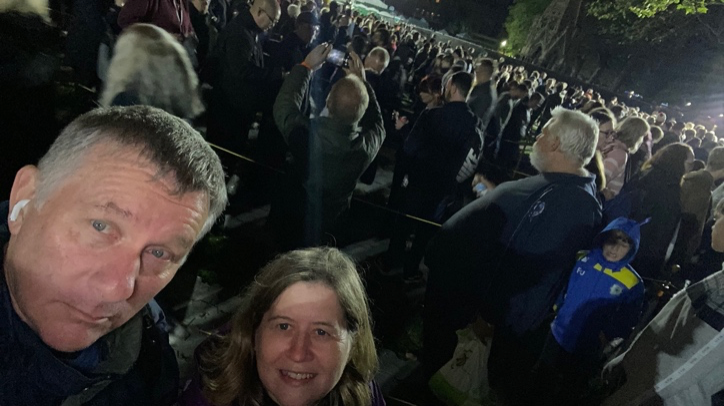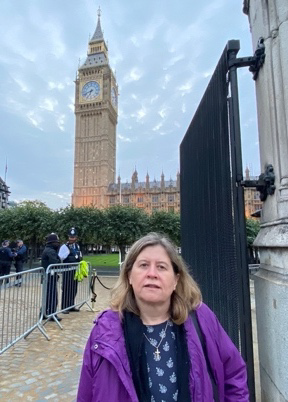The Queen’s lying-in-state
The Vigil of the Princes also became the Vigil of the People… and I was one of them, writes Baptist minister Esther Mason, one of the hundreds of thousands who chose to wait in line to walk past the coffin of our late Queen
Embed from Getty Images
Why queue for 8 hours for something which lasted no more than 10 minutes?
Why indeed? A hard question to answer even to myself.
A mark of respect?
A way to say thank you?
A gesture of solidarity?
The end of an era?
All I can say is that I felt the need to do it.
I was already due to be in London on the Friday of that week to visit a British Museum exhibit on ‘Feminine Power – from the divine to the demonic.’ My part-time role allowed the flexibility and so, a plan began to form, to visit the Queen as she lay in state. Initially to go to London early Thursday morning and then as they began to talk of 30-hour queues, a change of plan.
We left home in Gloucestershire on Wednesday evening – a small bag each, to see us through the next two days. A car drive, train, tube and then a walk took us to the back of the queue, close to the Globe theatre. And so, our pilgrimage began, for that is how it felt.
 The Dome of St Paul’s illuminated across the river, an iconic landmark on the London skyline, marked our beginning. We chatted briefly with those around us but for me this was predominantly a time for quiet. The stillness of the river, the night-time peacefulness of London felt an appropriate preparation for this vigil.
The Dome of St Paul’s illuminated across the river, an iconic landmark on the London skyline, marked our beginning. We chatted briefly with those around us but for me this was predominantly a time for quiet. The stillness of the river, the night-time peacefulness of London felt an appropriate preparation for this vigil.
It reminded me somehow of the birth of my three children. With each of them, I had laboured through the night. The recognition that some things are worth the effort and the waiting.
I remembered too fragments of T.S Eliot’s poem The Journey of the Magi – the descriptions of that ancient pilgrimage, which speaks of birth and death. Of how they experienced others saying, ‘That this was all folly.’ Some people had seemed incredulous that I would choose to go but others had understood, perhaps even feeling grateful that I could go.
In the Sunday service following the Queen’s death we’d had a sharing time. Some shared their memories of her Coronation Day. One remembered having been in London – a child sat in the temporarily-erected stands watching the Queen’s coach pass by. Most of my congregation too elderly now to attend and so I went, not just for myself but somehow as representative of church and community.
 About 2.30am we approached Westminster Bridge. The Houses of Parliament, Big Ben signalling we were close to our destination.
About 2.30am we approached Westminster Bridge. The Houses of Parliament, Big Ben signalling we were close to our destination.
But the queue takes a different route, continuing along the riverside towards Lambeth Bridge past the Covid Memorial wall.
We waited here for a long time, discovering from Twitter that the queue was paused for a naval rehearsal in Westminster Hall preparing for their role in Monday’s funeral. It gave me the opportunity to remember other losses, and the grief of those families, still recent and raw, bereaved by Covid. Remembering how they had to mourn their loss in such different times.
That image of the Queen, sat alone at the funeral of Prince Philip, the iconic representation of the aloneness of Covid grief.
Perhaps it was that image, seared into the national consciousness, which was part of what compelled us toward this queue. A sense that the Queen, alone then, because of her willingness to share with her people in the restrictions required by Covid, must not be alone now. A desire to show her family that we stood with them in their grief.
That it mattered to us too. We queued through the night without complaint. I cannot recall a cross word spoken by anyone around me throughout the walk. Instead, a shared sense of purposeful movement towards our destination, the joy of brief moments to sit down, to take the weight off your feet, the encouragement to one another to keep going.
Early on, a Birmingham man near us realised he’d left his wallet in the taxi and set off for a rendezvous with the driver to retrieve it. We promised to save his place and rejoiced with him on his return. Those in the queue included some who’d joined as they finished work, an impromptu act, others had travelled from towns or cities from across the land.
 The final stretch zigzagged across Victoria Tower Gardens. An opportunity to observe others in the queue as we moved back and forth. A realisation that there were people of all ages – from sleepy children to the elderly, individuals and family groups, British people of all skin tones – some dressed in their funeral best, most in their ordinary garb. People from other nations. Everyone there quietly waiting to mark this momentous time, to say their own personal goodbye.
The final stretch zigzagged across Victoria Tower Gardens. An opportunity to observe others in the queue as we moved back and forth. A realisation that there were people of all ages – from sleepy children to the elderly, individuals and family groups, British people of all skin tones – some dressed in their funeral best, most in their ordinary garb. People from other nations. Everyone there quietly waiting to mark this momentous time, to say their own personal goodbye.
We approached the security check. A last-minute panic – somehow, I had lost my wristband in this final stretch. The security guard unwilling to let me through until those around me in the queue convinced him I had been present with them for the last eight hours. I was allowed to past, grateful for the support of strangers.
And suddenly we were entering the building, ascending the stairs. An attendant encouraging us to take our time, to experience the moment. We had arrived. Looking down on the scene, the coffin and surrounds seemed so still, so unmoving that it could have been a waxworks tableau.
Only the eye movement of the beefeaters showed these were real flesh and blood. The coffin, the crown, the orb and sceptre – all seemed dwarfed by the vastness of Westminster Hall. This ancient building, a fitting setting for the pageantry and solemnity of the occasion.
A deep peacefulness, a reverent hush, a realisation that this was the destination of our pilgrimage. Strangers bound together in a common task but each marking the moment in their own individual way.
I approached the coffin and said a silent prayer, of thanks for the life of this willing servant of her God and her people, for her example of faithfulness in keeping the vows of duty and service she had chosen to make.
In Journey of the Magi, they experience a birth which was like a death. A death of their old way of being so that ‘they return no longer at ease in the old dispensation.’
 As we emerged from Westminster Hall into the dawn of a new day, I realised that we had born witness to a death, which also brings birth. The birth of a new dispensation, a new King.
As we emerged from Westminster Hall into the dawn of a new day, I realised that we had born witness to a death, which also brings birth. The birth of a new dispensation, a new King.
My hope and prayer is that this new dispensation will find its strength and source, as the Queen did, in that birth more than two thousand years ago. That moment, honoured by the Magi in their journey, when God became one of us, entering our world in humility, not to be served but to serve.
The Revd Esther Mason, Christ Church L.E.P (Baptist, Methodist, U.R.C)
Thumbnail image | Francais a Londres | Unsplash
Do you have a view? Share your thoughts via our letters' page.
Baptist Times, 22/09/2022